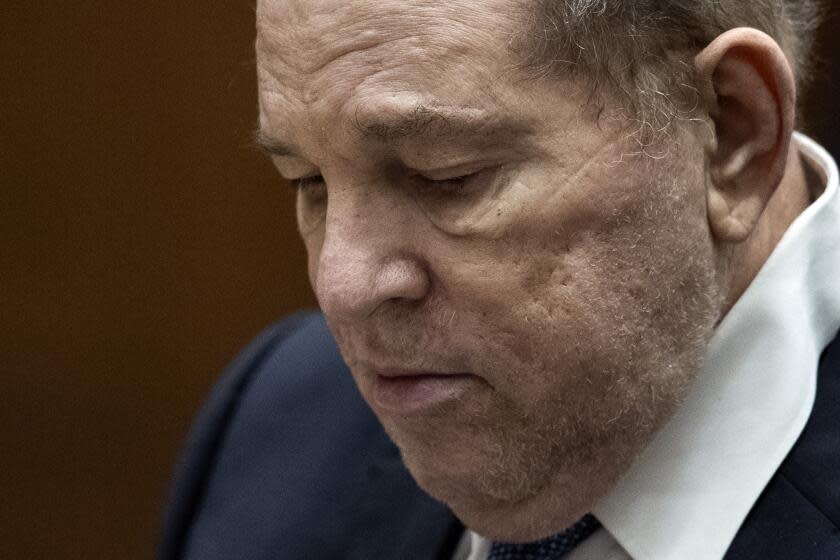Is Harvey Weinstein's California conviction in jeopardy after N.Y. appeals ruling?

Shortly after a New York appeals court overturned Harvey Weinstein's conviction on rape charges in Manhattan, a defense attorney in the disgraced movie mogul's Los Angeles case said the same should happen in California.
If Weinstein's lawyer Mark Werksman has any doubts about whether the same legal strategy will work in both states, he didn't betray them in his comments after Thursday's victory for his client.
“We faced the same fundamental unfairness in the Los Angeles case, where the judge let the jury hear about four uncharged allegations of sexual assault,” said Werksman. “Harvey was subjected to a firehose of uncharged and incredible allegations which destroyed his right to a fair trial on the charges in the indictment. The case here should be reversed for the same reasons the New York case was reversed.”
Not all legal experts are as convinced.
In its 77-page decision, the New York appellate court ruled that a Manhattan judge robbed Weinstein of a fair trial when he let prosecutors put three women on the stand who accused the Miramax co-founder of sex crimes that he had not been charged with. Those witnesses included a woman L.A. prosecutors had charged Weinstein with assaulting.
In Weinstein's Los Angeles trial — where he was indicted on 11 counts of rape and sexual battery — prosecutors took a similar approach, calling four women to the stand who accused him of uncharged assaults in New York, London, Puerto Rico and Toronto.
Dozens of women came forward to accuse Weinstein of sexual misconduct in 2017, ruining his career and landing him in prison. The New York decision marks a rare triumph since his downfall, but experts said it's unlikely he'll be able to overcome his California conviction on similar grounds.
A 1996 change to California evidence law broadly allows uncharged victims to testify in sex crimes cases if their allegations can help prove a pattern of behavior or propensity to commit a crime, said Dmitry Gorin, a former L.A. County sex-crimes prosecutor.
Read more: Harvey Weinstein rape conviction overturned by N.Y. court; California conviction stays
"The California case is independent of the New York verdicts that were overturned,” Gorin said. “The law on admitting prior sexual assault evidence in California is very broad, and the judge’s decision to let that evidence in can be challenged as an abuse of discretion."
Gorin added that Weinstein's chances of a successful appeal in California were "slim to none."
L.A. County Dist. Atty. George Gascón told The Times he remains "comfortable with our conviction."
"Our case against Mr. Weinstein is very solid. We didn't use the evidence New York did," Gascón said. "The California law is strong when comes to this kind of evidence.”
Los Angeles Superior Court Judge Lisa Lench, who oversaw Weinstein's 2022 trial in downtown L.A., did place significant limits on the number of so-called "prior bad acts" witnesses called by prosecutors. That number at one point was in the double digits, before Lench limited prosecutors to four.
Over the last three decades, a movement has grown to relax the law in sexual assault cases, according to Daniel Medwed, a professor of law and criminal justice at Northeastern who used to be a criminal appellate attorney in New York. Courts are becoming more open to introducing other evidence of sexual assault, he said, allowing prosecutors to build cases against suspected repeat offenders.
“If someone does this once or twice, it's likely they’ve done it a lot of times," Medwed said.
While New York's law may be out of step with evolving thinking on rules governing testimony in sexual assault cases — where often victims don't come forward against their accusers until long after the statute of limitations on such crimes has run out — Medwed said the state's rules provide a needed layer of protection for a defendant's civil rights.
“It’s a traditional view, maybe it’s a lingering civil libertarian view that the jury punishes someone not for who they are alleged to be, but what they’ve done in this case," he said. “Loosening the rules of evidence could be a slippery slope to an erosion of all our rights.”
John Manly, who has litigated on behalf of victims in the cases of USA gymnastics trainer Larry Nassar, the Catholic Church and USC and UCLA doctors, called the New York decision "a giant step backward in the effort to bring serial sexual predators to justice."
"Thankfully it will not impact California prosecutions of child molesters or serial rapists," he said. "Thirty years ago California addressed this very issue when it passed a law that specifically allows ‘bad acts’ testimony to show propensity to commit sexual assault."
Gov. Gavin Newsom, whose wife, Jennifer Siebel Newsom, testified at the Los Angeles trial that Weinstein raped her in 2005, said Thursday that Weinstein "should never see the light of day. Period. Full stop.”
"Let's just make something crystal clear: Harvey Weinstein is a stone-cold predator, a rapist, twice convicted. Not once. Twice," Newsom said during a news conference on renewable energy at a solar installation outside Winters, a farm town near Sacramento.
Weinstein has denied all wrongdoing in both states and has filed a notice of appeal in California, though a brief outlining the exact parameters of his appeal in L.A. has not been made public.
That filing is expected in late May.
Assistant editor Phil Willon contributed reporting from The Times' Sacramento bureau.
This story originally appeared in Los Angeles Times.

 Yahoo News
Yahoo News 
